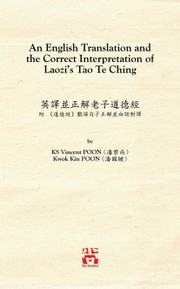Tao Te Ching
道德經
Background information
Tao Te Ching (《道德經》, or Dao De Jing), presumably written by Laozi (老子) of the 6th century BC, is one of the most famous and influential philosophical works in Chinese history. Written in fewer than 6000 Chinese characters, Tao Te Ching outlines the characteristics and roles of the fundamental Tao (道) and its Te (德, Manifestation of Tao) in the formation and maintenance of all in the Universe. Remarkably, it also depicts the underlying nature of governance and some natural laws, which, surprisingly, include modern scientific concepts such as atomic theory, chemical equilibrium, polarities, and the quantum uncertainty principle.
Unfortunately, Tao Te Ching is often misinterpreted by many for more than two thousand years. Their failures are mainly attributed to applying Taoist Religion (道教), Huang-Lao (黄老), and Confucian concepts in interpreting characters such as “鬼”, “神”, “仁”, “慈”, “善”, and “德”. Further, “若”, “似”, and “或” are also frequently misinterpreted, giving rise to the incorrect impression that Laozi was a scheming and calculating philosopher. Prominent interpreters of the past and present, including Heshang Gong (河上公), Wang Bi (王弼), Gao Heng (高亨), and James Legge, have all committed these types of errors in varying degrees.
This book provides readers with an annotated, line-by-line, concise, consistent, and correct English translation and interpretation of Tao Te Ching. Accompanied 674 footnotes include references and brief discussions on general misunderstandings. Further, to facilitate easy reading, the bare translated text is supplemented in a separate section, while the correct interpretation of difficult and complex sentences in vernacular Chinese (《道德經》艱深句子正解並白話對譯) in another. Accordingly, this book is perfect for anyone interested in Chinese philosophy.
Original Chinese Text
(Wang Bi's 王弼 Edition)
English Interpretation
by KS Vincent Poon (潘君尚) and Kwok Kin Poon (潘國鍵)
第六十七章 Chapter 67
____
181. 天下皆謂我道大,似不肖。夫唯大,故似不肖。若肖久矣。其細也夫!
All under Heaven say although my so-called Tao is great, it (似) appears (肖) not to be so. Alas, it is only because of its unlimited greatness that it appears not to be so. If it appears to be great, it would indeed be small long long time ago!
182. 我有三寶,持而保之。一曰慈,二曰儉,三曰不敢為天下先。慈故能勇;儉故能廣;不敢為天下先,故能成器長。
I have three treasures (三寶) that I always uphold (持) and rely on (保): the first is earnest adoration (慈) of Tao, the second is frugality (儉), and the third is not daring to lead and be the most preeminent (先) among all under Heaven. When one adores Tao, one can thus be courageous (勇); when one is frugal, one can thus flourish (廣); when one dares not to lead and be the most preeminent among all under Heaven, one can thus become (成) a distinguished and talented (器) leader (長) among all.
183. 今舍慈且勇;舍儉且廣;舍後且先;死矣!夫慈以戰則勝,以守則固。天將救之,以慈衛之。
第六十八章 Chapter 68
184. 善為士者,不武;善戰者,不怒;善勝敵者,不與;善用人者,為之下。
185. 是謂不爭之德,是謂用人之力,是謂配天古之極。
第六十九章 Chapter 69
186. 用兵有言:吾不敢為主,而為客;不敢進寸,而退尺。
187. 是謂行無行;攘無臂;扔無敵;執無兵。
188. 禍莫大於輕敵,輕敵幾喪吾寶。故抗兵相加,哀者勝矣。
第七十章 Chapter 70
189. 吾言甚易知,甚易行。天下莫能知,莫能行。
190. 言有宗,事有君。夫唯無知,是以不我知。
191. 知我者希,則我者貴。是以聖人被褐懷玉。
第七十一章 Chapter 71
192. 知不知上;不知知病。
193. 夫唯病病,是以不病。聖人不病,以其病病,是以不病。
第七十二章 Chapter 72
194. 民不畏威,則大威至。無狎其所居,無厭其所生。夫唯不厭,是以不厭。
195. 是以聖人自知不自見;自愛不自貴。故去彼取此。
第七十三章 Chapter 73
196. 勇於敢則殺,勇於不敢則活。此兩者,或利或害。天之所惡,孰知其故?是以聖人猶難之。
197. 天之道,不爭而善勝,不言而善應,不召而自來,繟然而善謀。天網恢恢,踈而不失。
第七十四章 Chapter 74
198. 民不畏死,奈何以死懼之?若使民常畏死,而為奇者,吾得執而殺之,孰敢?
199. 常有司殺者殺。夫代司殺者殺,是謂代大匠斲;夫代大匠斲者,希有不傷其手矣。
第七十五章 Chapter 75
200. 民之飢,以其上食稅之多,是以飢。
201. 民之難治,以其上之有為,是以難治。民之輕死,以其上求生之厚,是以輕死。
202. 夫唯無以生為者,是賢於貴生。
第七十六章 Chapter 76
203. 人之生也柔弱,其死也堅強。萬物草木之生也柔脆,其死也枯槁。
204. 故堅強者死之徒,柔弱者生之徒。
205. 是以兵強則不勝,木強則共。強大處下,柔弱處上。
第七十七章 Chapter 77
206.天之道,其猶張弓與?高者抑之,下者舉之;有餘者損之,不足者補之。
207. 天之道,損有餘而補不足。人之道,則不然,損不足以奉有餘。
208. 孰能有餘以奉天下,唯有道者。是以聖人為而不恃,功成而不處,其不欲見賢。
Today, many abandon (舍) earnest adoration (慈) of Tao yet adopt (且) blind courage (勇), abandon frugality (儉) yet adopt raw prosperity (廣), abandon placing oneself behind (後) all others yet adopt preeminence (先). They shall all perish (死) indeed! Alas, applying earnest adoration (慈) of Tao in battles shall ensure one’s victory, while applying it in defending shall make one’s garrison firm (固); Nature will (將) then surely come to one’s aid (救) and utilize (以) one’s earnest adoration of Tao to protect (衛) one’s safety.
FOR FURTHER TRANSLATION, FOOTNOTES, AND ELABORATIONS
PLEASE SEE :

An English Translation and the Correct Interpretation of Laozi’s Tao Te Ching 英譯並正解老子道德經 附 《道德經》艱深句子正解並白話對譯
by KS Vincent POON and Kwok Kin POON (July. 2020)
ISBN 978-1-989485-15-6
Tao Te Ching (《道德經》, or Dao De Jing), presumably written by Laozi (老子) of the 6th century BC, is one of the most famous and influential philosophical works in Chinese history. Written in fewer than 6000 Chinese characters, Tao Te Ching outlines the characteristics and roles of the fundamental Tao (道) and its Te (德, Manifestation of Tao) in the formation and maintenance of all in the Universe. Remarkably, it also depicts the underlying nature of governance and some natural laws, which, surprisingly, include modern scientific concepts such as atomic theory, chemical equilibrium, polarities, and the quantum uncertainty principle.
Unfortunately, Tao Te Ching is often misinterpreted by many for more than two thousand years. Their failures are mainly attributed to applying Taoist Religion (道教), Huang-Lao (黄老), and Confucian concepts in interpreting characters such as “鬼”, “神”, “仁”, “慈”, “善”, and “德”. Further, “若”, “似”, and “或” are also frequently misinterpreted, giving rise to the incorrect impression that Laozi was a scheming and calculating philosopher. Prominent interpreters of the past and present, including Heshang Gong (河上公), Wang Bi (王弼), Gao Heng (高亨), and James Legge, have all committed these types of errors in varying degrees.
This book provides readers with an annotated, line-by-line, concise, consistent, and correct English translation and interpretation of Tao Te Ching. Accompanied 674 footnotes include references and brief discussions on general misunderstandings. Further, to facilitate easy reading, the bare translated text is supplemented in a separate section, while the correct interpretation of difficult and complex sentences in vernacular Chinese (《道德經》艱深句子正解並白話對譯) in another. Accordingly, this book is perfect for anyone interested in Chinese philosophy.
WorldCat/Library: [WorldCat] [U of Oxford] [U of Cambridge] [Harvard U] [Kyoto U] [National Taiwan U] [HKU] [CUHK]etc...
Jump to: Taoism
Jump to: Works in Standard Script